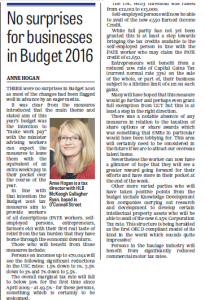MAKING WORK PAY
There were no surprises in Budget 2016 as most of the changes had been flagged well in advance by an eager media. It was clear from the measures introduced that the main theme and stated aim of this year’s budget was the intention to “make work pay” with the Minister advising that workers can expect the measures to leave them with the equivalent of an extra week’s pay in their pocket over the course of the year.
In line with that intention the Budget 2016 tax measures aim to provide workers of all descriptions (PAYE workers, self-employed persons,  entrepreneurs, farmers etc.) with their first real taste of relief from the tax burden that they have borne through the economic downturn. Those who will benefit from those measures include:
entrepreneurs, farmers etc.) with their first real taste of relief from the tax burden that they have borne through the economic downturn. Those who will benefit from those measures include:
- Persons on income up to €70,044 will see the following significant reductions in the USC rates – 1.5% down to 1%, 3.5% down to 3% and 7% down to 5.5%. The overall marginal tax rate will fall to below 50% for the first time since April 2009 – at 49.5% – for these persons, something which is certainly to be welcomed. The USC entry threshold was raised from €12,012 to €13,000.
- Self-employed persons will now be able to avail of the new €550 Earned Income Credit. Whilst full parity has not yet been granted this is at least a step towards bringing the tax credits available to the self-employed person in line with the PAYE worker who may claim the PAYE credit of €1,650.
- Entrepreneurs will benefit from a reduced 20% rate of CGT (current normal rate 33%) on the sale of the whole, or part of, their business subject to a lifetime limit of €1,000,000 on such gains. Many will have hoped that this measure would go further and perhaps even grant full exemption from CGT but this is at least a step in the right direction.
- Farmers will see an extension to the existing tax reliefs that relate to their industry and the introduction of a new succession transfer partnership model to incentivise the gradual transfer of control to the younger farmer. This model would appear to be quite tax efficient with the allocation of an income tax credit of up to €5,000 per annum for five years to the Partnership to be split according to the profit sharing agreement.
- Persons on the minimum wage will see their hourly rate increase by 50 cent to €9.15 per hour, to be implemented from 1st January 2016.
- Home Carers will benefit from an increase in the Home Carer’s Credit from €810 to €1,000 and an increase in their income threshold from €5,080 to €7,200.
- Parents will benefit from free preschool places for children aged between 3 and 5.5 years, an increase in child benefit of €5 per month per child and the introduction of two weeks paternity leave for fathers. The very welcome possibility of the free GP care scheme being extended in 2016 to cover children up to 12 years of age (subject to negotiation with GPs) was also raised.
- Those paying Local Property Tax will see the amount they pay frozen until 2019.
- Pension fund holders will welcome the abolition of the pension levy of 0.15% which was deemed by the Minister to have “done its job”.
There was a notable absence of any measures in relation to the taxation of share options or share awards which was something that SMEs in particular would have been lobbying for. This area will certainly need to be considered in the future if we are to attract our overseas talent home. Nevertheless the worker can now have a glimmer of hope that they will see a greater reward going forward for their efforts and have more in their pocket at the end of the week.
Medical card holders and those over 70 (whose aggregate income does not exceed €60,000) were not forgotten and they will now pay a maximum rate of USC of 3%. Social welfare recipients can look forward to a Christmas bonus of 75% of their weekly payment and pensioners will see a rise of €3 per week in their pension and €2.50 per week in their fuel allowance.
Other more varied parties who will have taken positive points from the budget include:
- “Knowledge Development Box” companies carrying out research and development to develop certain intellectual property assets who will be able to avail of the new 6.25% Corporation Tax rate. This structure is being heralded as the first OECD compliant model of its kind in the world which sounds quite impressive!
- Persons in the haulage industry will benefit from significantly reduced commercial motor tax rates.
- Nursing home companies may now raise EIIS funds to carry out expansion works to existing nursing homes and will also welcome the confirmation that the Fair Deal scheme will continue in 2016.
- Developers who will hope to be engaged by NAMA to construct the 20,000 housing units required by 2020 (albeit that this appears to be more relevant to Dublin-based developers given that 90% of the housing units are required in the greater Dublin area).
Needless to say there will be many who will have hoped for more from Budget 2016 and it is likely, for example, that the banking industry will not have been overly impressed with the extension of the banking levy to 2021. Smokers have been hit with the only tax rise in the budget and will see a further 50 cent rise in the cost of a packet of cigarettes.
In general however the budget has been a “good news” one and it does appear that Budget 2016 seems to largely comply with Minister Brendan Howlin’s summary in his concluding remarks that the measures taken were “moderate, sensible and commensurate with economic requirements”. Minister Michael Noonan predicted that Ireland is set to be Europe’s fastest growing economy for the second year in a row – let’s hope he is correct and that future “economic requirements” will allow forthcoming budgets to continue on the track set by Budget 2016.
A condensed version of this article appeared in the print issue of the Limerick Leader on 17 October 2015
